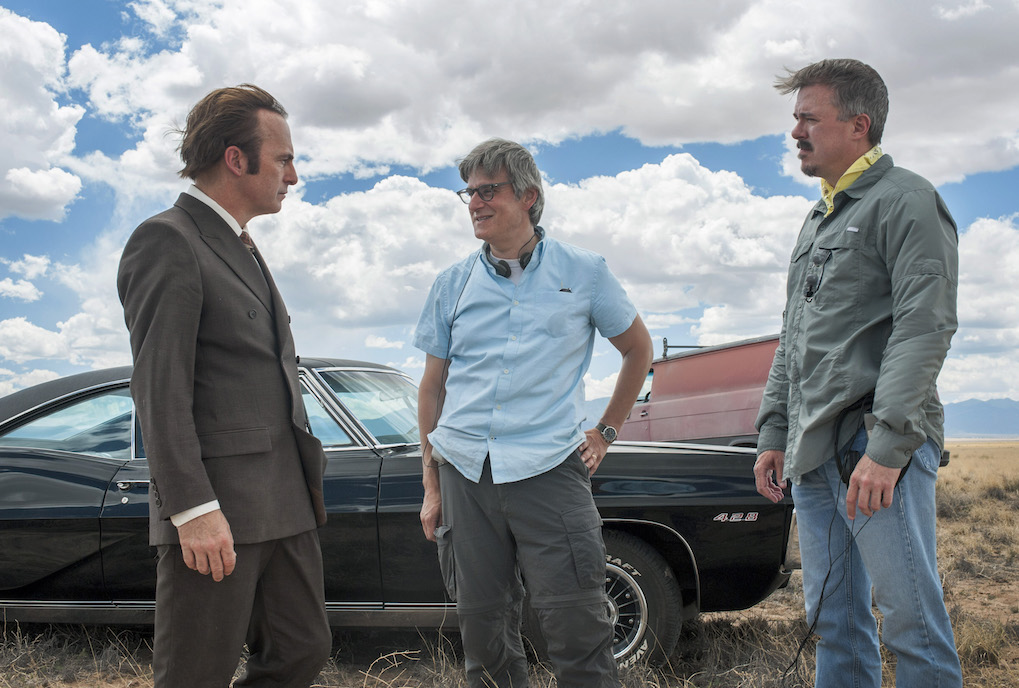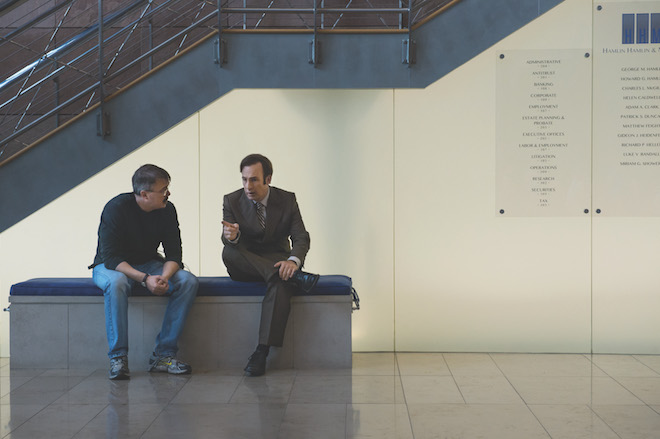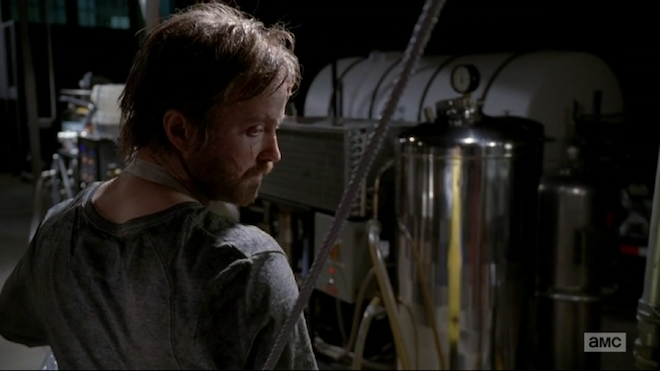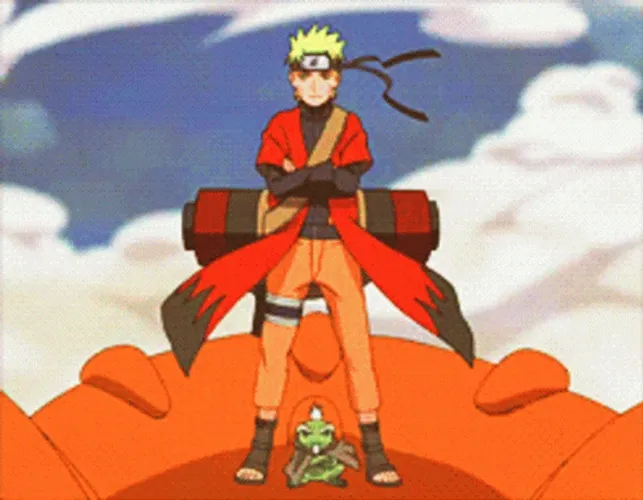It’s Showtime, Folks: Inside The ‘Better Call Saul’ Writers’ Room With Vince Gilligan
The legacy of 'Breaking Bad' is one hell of a thing to contend with.

After breaking bad along with Jesse and Walt and the Breakfast Kid for five seasons and obsessively absorbing every artful, intelligent minute of the even better Better Call Saul, it would be fair to say that I’m a pretty big fan of Vince Gilligan’s work as a creator, producer and writer of top-shelf cable drama.
When I got my shot at an interview, this was pretty much my response:
Before chatting to Gilligan, I came up with what was essentially a season of Inside the Actors Studio questions and tried to narrow them down. Instead, I ended up just having a great chat to someone who really knows and loves his work. Notwithstanding a heavy dose of Southern American charm, Gilligan’s enthusiasm for his work and warmth in talking about his team were evident in everything he talked about and are an infectious delight, even now as I’m writing this up.
Talking from Albuquerque, New Mexico, where he and his writers are halfway through planning for the third season of Better Call Saul, Gilligan talked to Junkee about the importance of not cheating your audience, Donald Trump and what surprises he’s found in writing a prequel to one of the most popular TV series ever.
Season Two Confirms It: ‘Better Call Saul’ Is The Most Unique And Artful Show On TV
Junkee: Thanks so much for talking to us! We’re big fans. You can tell just from watching that Better Call Saul is the work of a really mature team — you can see the things you all learned while doing Breaking Bad which makes it very rich, very detailed television. I think it’s the best TV you’ve made.
Fantastic. I love hearing that! What tickles me about this show is when people come up to me and say “I loved Breaking Bad, but I think Better Call Saul is even better”. There was a very real possibility that Peter Gould (the co-creator and executive producer) and I contemplated that the show would be a terrible artistic failure and that it would sully the reputation of the mothership series. It’s just a wonderful thing to think, for a lot of folks, the enjoyment you’re providing is increasing and not lessening.

Vince Gilligan talking with Bob Odenkirk on the set of Better Call Saul.
You’ve talked in other interviews about the feedback loop between the actors and your writing. How that has influenced where the characters on Better Call Saul have gone and what the show has become?
It’s a wonderful thing: writing for television. You’re telling so many hours of story in a television series versus two or one and a half hours in a movie. As a writers’ room with all of us together working in harmony, you can listen to the rhythms of the actors and you learn from them and you pay attention, [so] a wonderful kind of a feedback loop develops.
For instance, the original character for Jesse Pinkman in that first episode of Breaking Bad was a little jerk who really only existed in story terms to help Walter White get his entrée into the world of criminality and illegal drug making. And once he had served his purpose, I was going to kill his character off.
But once all of us got to know Aaron Paul, we realised: he’s a wonderful human being who goes through life thinking the best of people and wanting to be as good a person as possible. And while not every bit of that could rub off on Jesse, quite a bit of it did, and Jesse became the moral centre of Breaking Bad — or certainly a moral centre of Breaking Bad. I don’t think that would’ve happened if Aaron Paul wasn’t that person and we hadn’t allowed those wonderful aspects of his personality to feed back into the story and to rub off onto the characters.

Because nothing says “We think you’re a wonderful human being” like spending the final season in Nazi’s meth torture pit!
That’s also a wonderful thing about being fully present in your writing and the level of experience you have, too — you can say “I’m not set on this one thing being exactly what has to happen to this character next”.
Exactly. Exactly right. But on the other side of the coin is, once certain facts have been established in the backstory and once it’s on the screen, sometimes as a writer you’re tempted to change them or fudge them a bit.
For instance, going from Breaking Bad to the world of Better Call Saul, certain bits of history for some of these characters have been established on Breaking Bad and sometimes you sit there in the writers’ room with all of the writers and you say to yourself, for instance, “I wonder if we could forget that Jimmy McGill was married twice”, because he mentions that in some offhand comment on Breaking Bad.
You can do that, you can get away with that, but it always feels like cheating. We try very hard to never cheat because we love that the audience has been so attentive and pays close scrutiny to the story we’re telling and we don’t want to punish that attention with laziness on our part — we want to earn that attention by being scrupulous.
[Special Junkee spoiler: season three of Better Call Saul will unfortunately not include an episode where Saul learns the (Australian) origin of the phrase “chicky babes”.]
I suppose it’s quite a unique pressure in some ways, taking those expectations that your audience has about where things are going to end up and turning that into something that feels meaningful to watch. What I like about Better Call Saul is that there’s a real weight to where you know he’s going to end up.

Just a reminder…
I think so too. It took us a while to realise this but there’s a real tragedy at the heart of Better Call Saul. It’s a tragedy that this man, Jimmy McGill, will eventually become Saul Goodman.
I have to say that we didn’t realise that from the start. At the start we thought “Oh, Saul Goodman, he wears the insane colourful suits, he’s got that nutty office with the American constitution on the wall and the styrofoam Greek columns… he’s just so tacky, he’s such an oddball. He’s funny and fun”. But as we’ve worked on Better Call Saul for going on three years, we’ve come to realise it’s sort of a Pagliacci feeling we have for him now: the idea of a clown that cried. The idea of a character who is not necessarily what he seems to be and what he seems to be — something we thought was fun — was actually something that’s not necessarily entertaining.
It’s not a good thing to be Saul Goodman — it took us a long time to realise that.
It’s amazing what that brings to the show, too. I tried to re-watch the first season knowing about Chuck’s betrayal of his brother (Jimmy) and I just couldn’t do it – it was too sad. He’s such a great counterweight to Jimmy because he’s all about detail and control and Jimmy’s trying to make it work on the fly — they’re such a great balance to each other.
Michael McKean who plays Chuck, we are just honoured to have him on our show.

Michael McKean’s talent is visible from space.
But then you have another great character like Kim who brings something else to their biblical brother dynamic and I love her arc in season two. It’s so rare to see a male/female relationship that not about “will-they/won’t-they”, but about two people who are genuine friends.
I couldn’t agree with you more. They are such great friends. Rhea Seehorn who plays Kim was such a find. Our wonderful casting people, Sharon Bialy and Sherry Thomas found Rhea and I will be thankful eternally for that fact. Even as funny and as perfect and as exquisite as [Seehorn’s] comic timing is, she is very easy to take seriously and it’s very easy to see how she invests her character with such gravitas.
You love the character so much because she works very hard; no one’s ever given her anything, she’s earned every single thing that she has and she wants to keep it. She worries about the future, she worries about moving forward and continuing her career path. And she loves Jimmy and she respects him, but you can tell she worries too, you know; “Is this the guy to be with?” [Kim] is so multidimensional, she’s so complex and layered and [Seehorn] is so marvellous in portraying all of that. She’s the secret weapon on our show, I think.
Last question: I read an article in the Guardian recently that said because Walter White was such an arrogant, egotistical monster, his popularity (and that of white male antiheroes like him) in some way informed the rise of Donald Trump.
Oh wow, I’ve gotta tell that to the writers, I have not read that. I did not know about that, oh my goodness.

Trump’s immigration policy was lifted directly from the Heisenberg playbook.
So the obvious question is: how do you feel being responsible for Donald Trump?
Wow. I did not know about that and it’s an interesting feeling to know that something you had a hand in as a writer, something you had a hand in creating has essentially taken on such a life of its own around the globe that such opinion pieces get written. [laughs] It’s a strangely prideful thing I have to say — at first blush, that’s my instant reaction.
I don’t take any personal responsibility for Donald Trump, having said that. I think only Donald Trump can take responsibility for Donald Trump. I think folks like that have been with us for the whole history of mankind and, fortunately or unfortunately, however you slice it, I think folks like that have appeared in every country and culture around the world. Sometimes they get a bigger podium than other times but I think it’s interesting that Walter White is on people’s minds that much, that that thought would occur.
–
Better Call Saul‘s second season is out now on Blu-ray, DVD and Digital. Season three will hit Stan some time in 2017.
–
Courteney Hocking is a Melbourne-based writer and broadcaster. She has written for Good News Week, The Guardian & many more. You can follow her on Twitter @courteneyh.